Blog
Next-Level Agentic Coding with Nix and Flox
Steve Swoyer | 26 Sept 2025

Flox is a cross-platform, cross-language package manager, built on top of open source Nix that's perfect for vibe coding, prototyping, or agentic development. A Flox-powered agentic development environment gives Cursor, CoPilot, Claude Code, Codex, and other tools everything they’ll need to create portable, reproducible solutions.
Even better, the Flox Catalog has millions of historical package-version combinations, so agents can almost always find what they need.
The same semantics that make Flox such an intuitive lift for humans are also ideal for large language models: Agents use imperative commands to discover (flox search), find versions of (flox show), and install (flox install) dependencies. And because Flox is also a virtual environment manager, agentic tools won’t squander time (and tokens) debugging dependency conflicts. In fact, Flox makes it possible to run conflicting versions of software dependencies in the same environment, on the same system, at the same time.
The upshot is that agentic development with Flox can get you from zero to working prototype much more quickly—without modifying your $HOME or making global changes of any kind to your system.
tl;dr: With a little help from a Flox-aware CLAUDE.md, llms.txt, AGENT.md, README.md, or FLOX.md, coding assistants and ai agents can use a Flox-based agentic development environment to quickly and reliably build and improve working solutions.
Bootstrapping Agentic Dev Environments
For work with your preferred programming languages and/or toolchains, start with a FLOX.md that gives the agent the context and knowledge it needs to use and work with Flox.
You can optimize this document to suit your requirements: for example, if you want the agent to build language- and/or tool-chain-specific Flox environments, focus on Flox features that promote reproducibility, simplify conflict management, and permit cross-platform portability.
Python
The first example prompts the agent to create a Python 3.12 dev environment, with all dependencies pulled from the Flox Catalog. It also includes pip and uv for interoperability with existing Python projects.
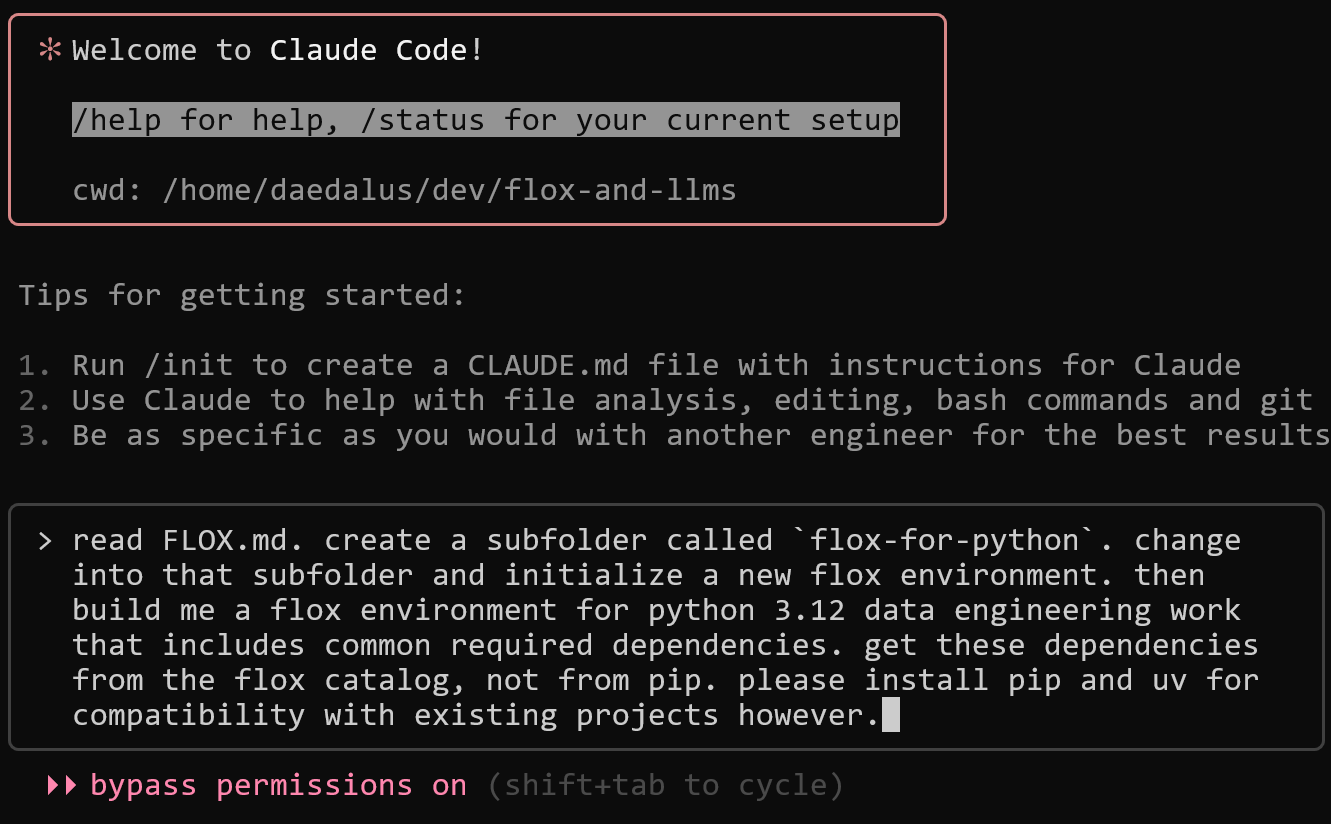
Agents use imperative commands (flox search, flox show, and flox install) to search for and install packages from the Flox Catalog. Setup usually finishes in less than a minute, on average.
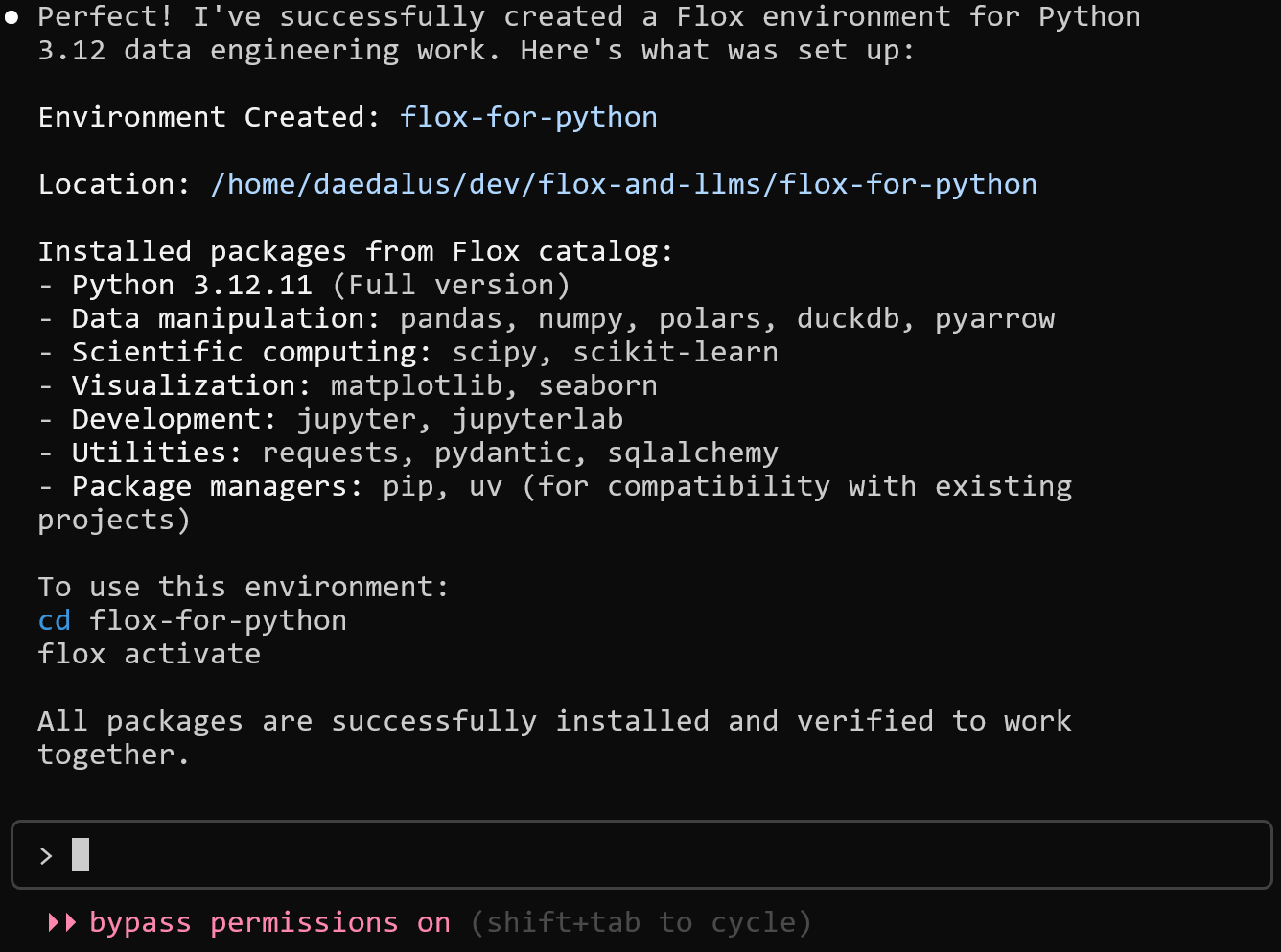
Changing into the flox-for-python sub-directory and running the flox edit command confirms that the environment not only exists but is populated with a panoply of Python dependencies:
[install]
python312Full.pkg-path = "python312Full"
pandas.pkg-path = "python312Packages.pandas"
numpy.pkg-path = "python312Packages.numpy"
polars.pkg-path = "python312Packages.polars"
duckdb.pkg-path = "python312Packages.duckdb"
pyarrow.pkg-path = "python312Packages.pyarrow"
scipy.pkg-path = "python312Packages.scipy"
scikit-learn.pkg-path = "python312Packages.scikit-learn"
matplotlib.pkg-path = "python312Packages.matplotlib"
seaborn.pkg-path = "python312Packages.seaborn"
jupyter.pkg-path = "python312Packages.jupyter"
jupyterlab.pkg-path = "python312Packages.jupyterlab"
requests.pkg-path = "python312Packages.requests"
pydantic.pkg-path = "python312Packages.pydantic"
sqlalchemy.pkg-path = "python312Packages.sqlalchemy"
pip.pkg-path = "python312Packages.pip"
uv.pkg-path = "uv"This includes most of what a data engineer might need, along with JupyterLab. But Flox also supports built-in service management, so you (or the agent) can configure it to automatically start and stop your JupyterLab instance. The next prompt directs the agent to define JupyterLab as a Flox-managed service:

This task, too, usually completes in less than one minute. Once the agent finishes, you can run flox activate -s or (from within your activated agentic development environment) flox services start jupyterlab to start JupyterLab.
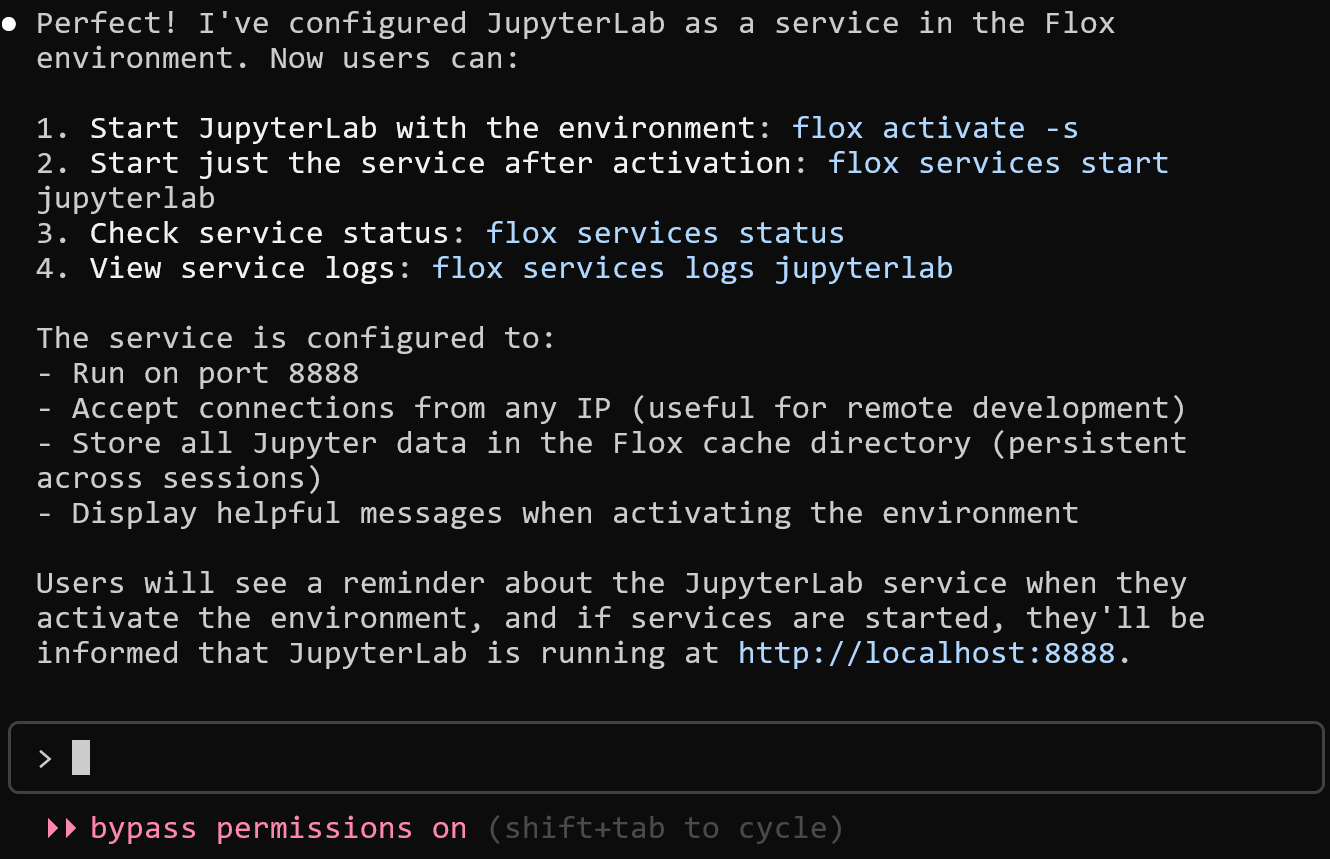
Running flox edit shows the logic the agent created to bootstrap the JupyterLab service:
[hook]
on-activate = '''
# Create jupyter config directory if it doesn't exist
mkdir -p "$FLOX_ENV_CACHE/jupyter/runtime"
'''
[profile]
common = '''
jupyter_token() {
flox services status 2>/dev/null | grep -q "^jupyterlab.*Running" || {
echo "JupyterLab not running. Start with: flox services start jupyterlab"
return 1
}
jupyter lab list 2>/dev/null | grep "http://" || echo "http://localhost:8888 (token pending...)"
}
if flox services status 2>/dev/null | grep -q "^jupyterlab.*Running"; then
echo "JupyterLab running. Use 'jupyter_token' for auth URL"
fi
'''
[services]
[services.jupyterlab]
command = "jupyter lab --no-browser --ip=0.0.0.0 --port=8888"
vars.JUPYTER_DATA_DIR = "$FLOX_ENV_CACHE/jupyter"
vars.JUPYTER_CONFIG_DIR = "$FLOX_ENV_CACHE/jupyter/config"
vars.JUPYTER_RUNTIME_DIR = "$FLOX_ENV_CACHE/jupyter/runtime"
is-daemon = false
shutdown.command = "jupyter lab stop 8888"Now run flox activate -s to use your Python 3.12 agentic development environment—with a built-in JupyterLab service:
$ flox activate -s
✅ You are now using the environment 'flox-for-python'.
To stop using this environment, type 'exit'
JupyterLab service is running at http://localhost:8888
Run 'jupyter_token' to get the authentication URL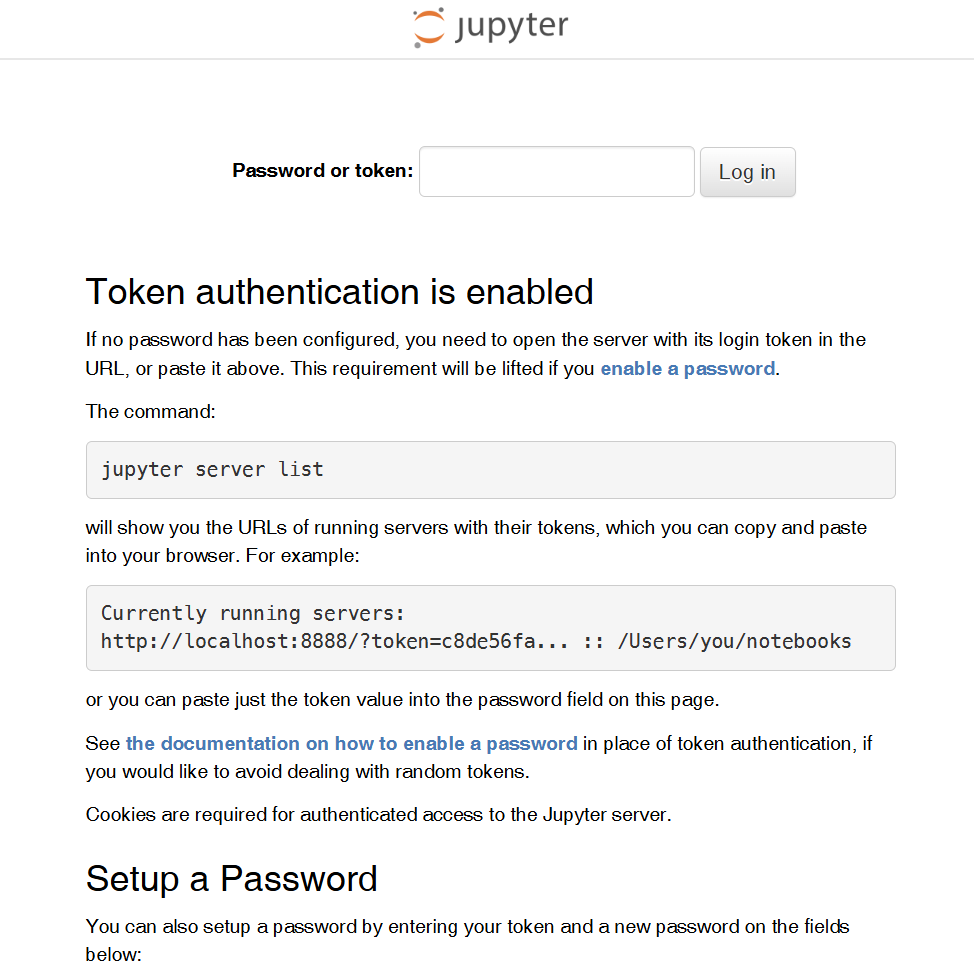
You can customize this as much as you like. If you tend to work with a specific relational database, for example, you can add Python bindings for that platform, as well as required C/C++ dependencies via gcc-unwrapped and other packages. If you depend on dbt, you (or the agent) can add current or historical versions of the dbt or python312packages.dbt-core` packages.
If you need to build with a different version of Python, you—or the agent—can modify your Flox manifest.

In this case, the agent (Claude Code) isn’t clever enough to recognize that this can be accomplished by copying the manifest and running a scripted search-and-replace, but it nevertheless gets the job done.
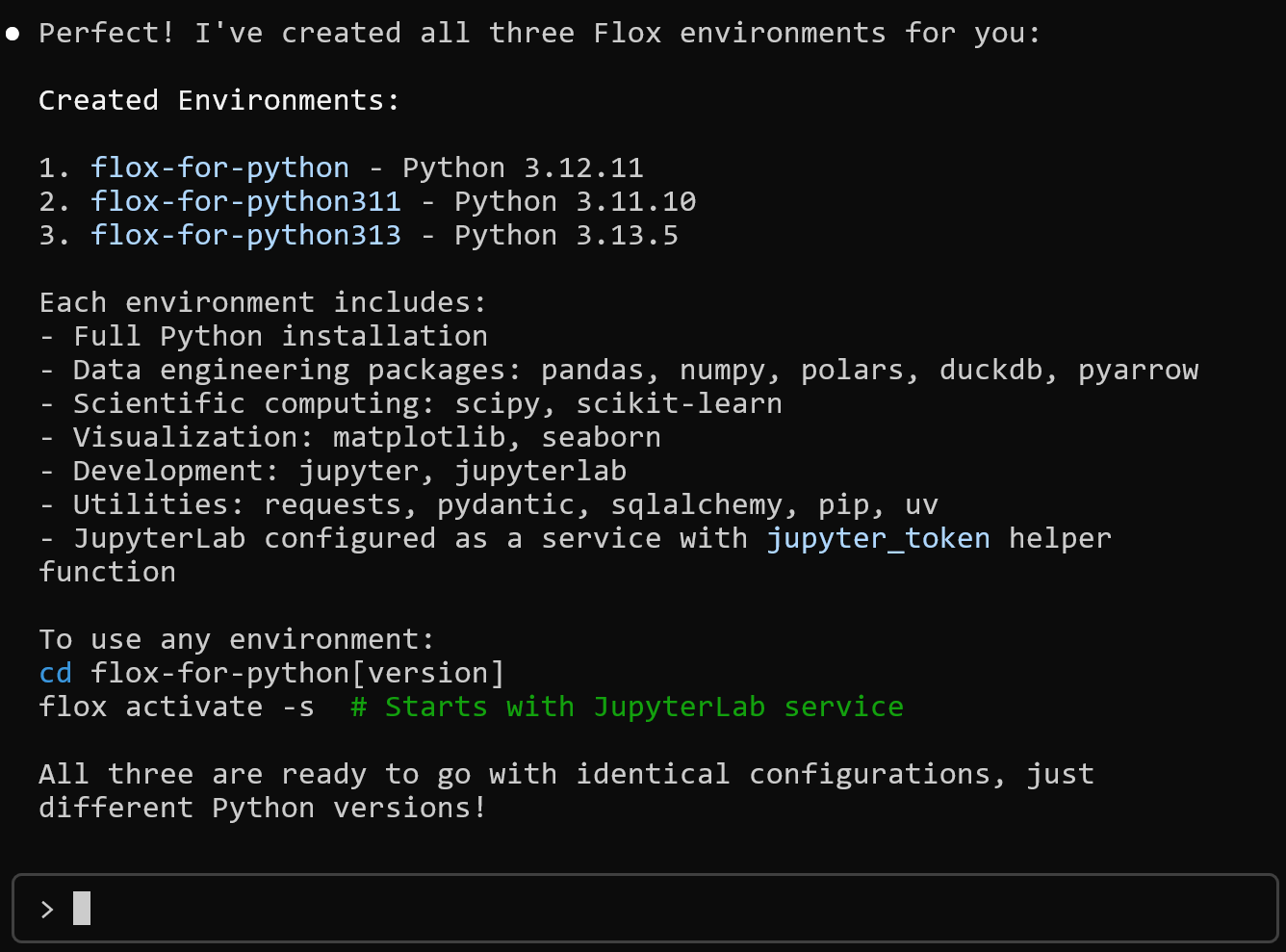
C or C++
This example prompts Claude Code to set up a Flox environment for C and C++ development. It tells the agent to create a new subfolder (flox-for-cpp), switch into it, and initialize the Flox agent development environment. From there, the agent is to build out a functional toolchain for C/C++ work: platform-specific compilers (gcc on Linux, clang on macOS), build systems (cmake, ninja, make), debuggers (gdb, lldb), and other essentials (valgrind, clang-tools). All dependencies come from the Flox Catalog; in this case we’ll also tell the agent to pin dependencies to enable reproducibility across platforms/over time.
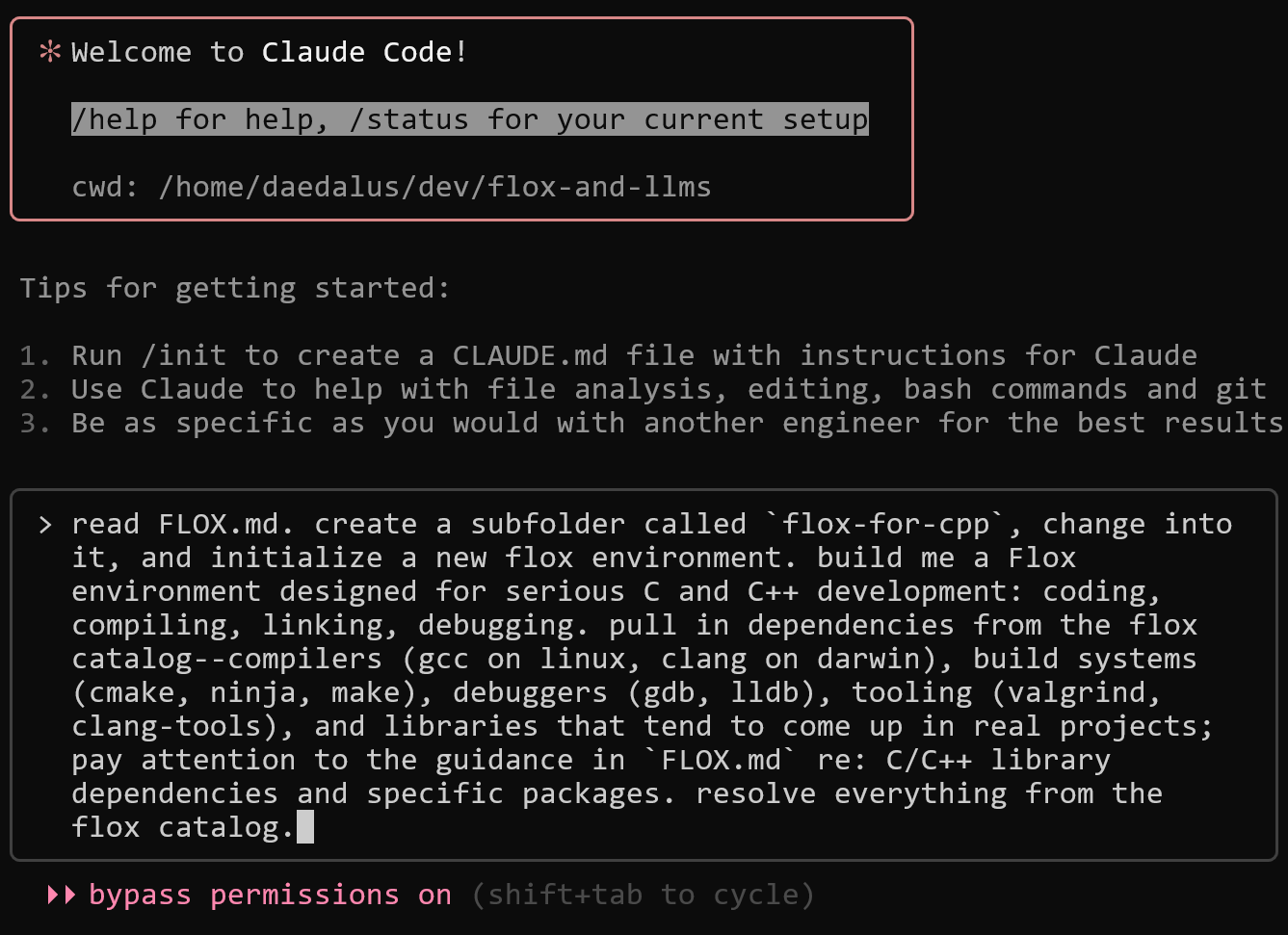
With the default FLOX.md, the agent typically completes initial setup in less than two minutes.
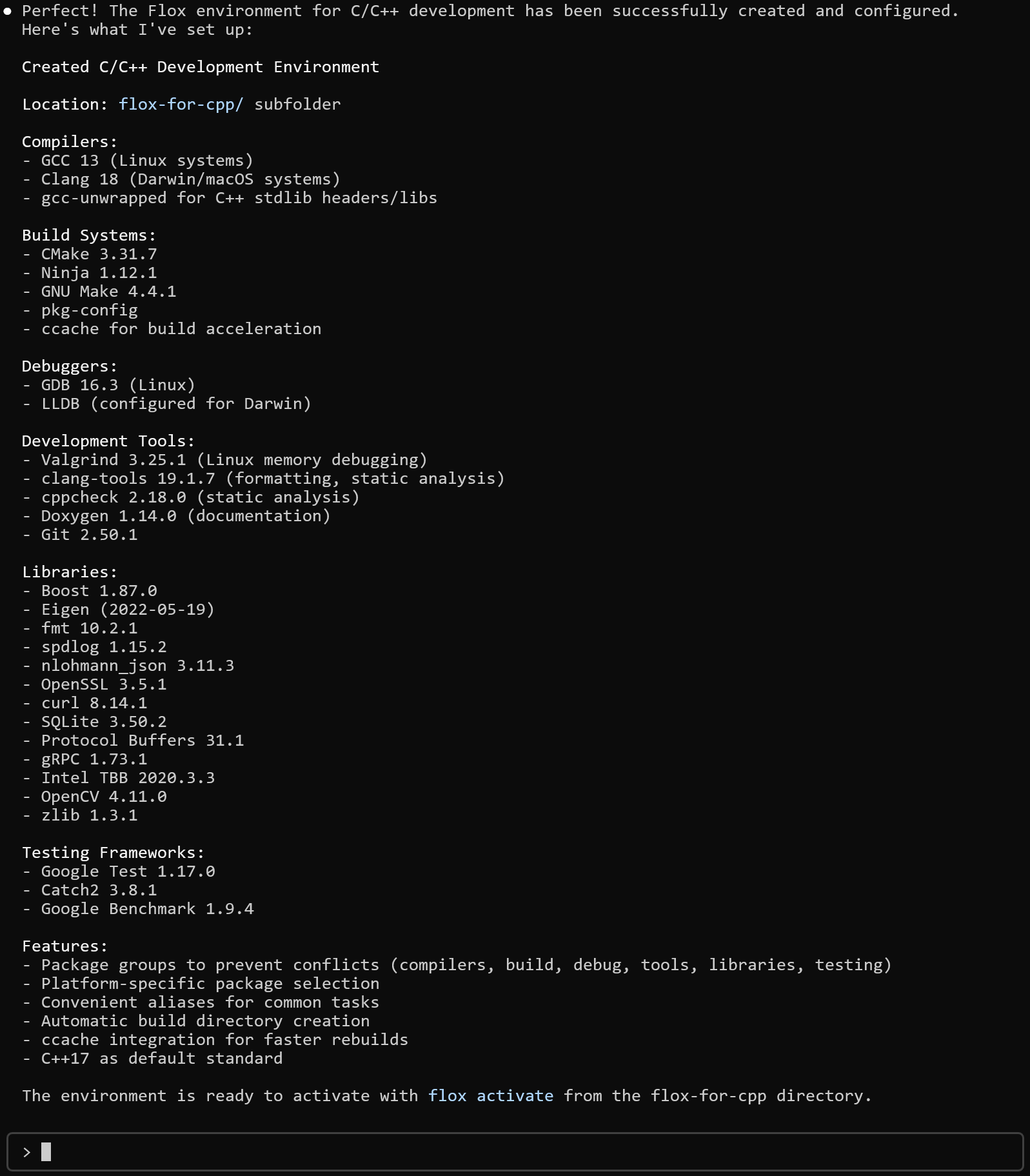
You can also tell the agent to pin the packages in your agentic development environment to specific versions. This way, it's always reproducible across space (locally, in CI, in production) and time (today, tomorrow, five years from now).
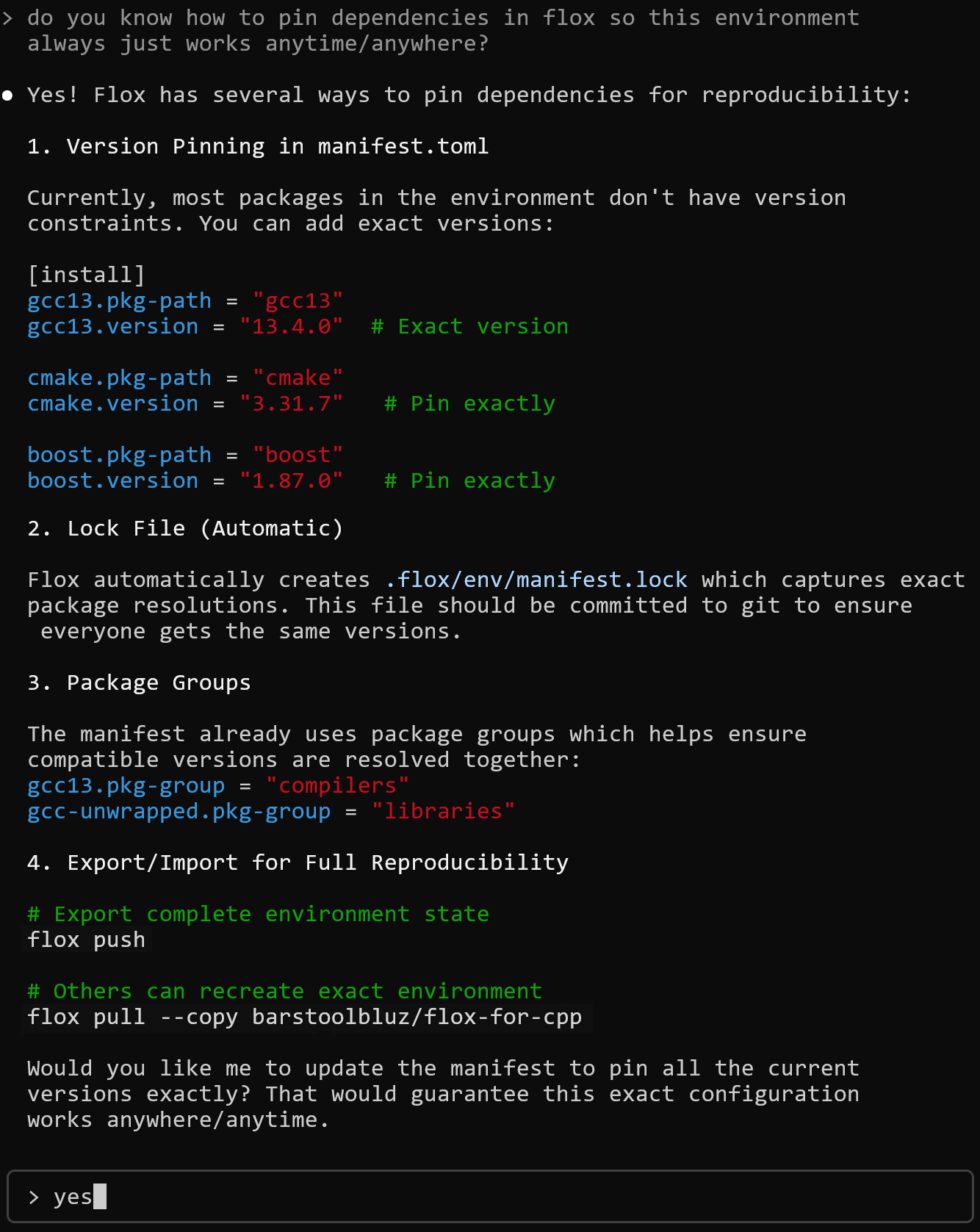
Changing into the flox-for-cpp directory and running flox edit shows the following:
[install]
## Core Compilers - Platform-specific defaults
gcc13.pkg-path = "gcc13"
gcc13.version = "13.4.0"
gcc13.pkg-group = "compilers"
gcc13.systems = ["x86_64-linux", "aarch64-linux"]
clang_18.pkg-path = "clang_18"
clang_18.pkg-group = "compilers"
clang_18.systems = ["x86_64-darwin", "aarch64-darwin"]
## Essential for C++ stdlib headers/libs
gcc-unwrapped.pkg-path = "gcc-unwrapped"
gcc-unwrapped.version = "14.3.0"
gcc-unwrapped.priority = 6
gcc-unwrapped.pkg-group = "libraries"
## Build Systems
cmake.pkg-path = "cmake"
cmake.version = "3.31.7"
cmake.pkg-group = "build"
ninja.pkg-path = "ninja"
ninja.version = "1.12.1"
ninja.pkg-group = "build"
gnumake.pkg-path = "gnumake"
gnumake.version = "4.4.1"
gnumake.pkg-group = "build"
...This is an abridged list. The complete manifest runs to almost 200 lines. You can view it here if you’re curious.
Claude Code again populated the agentic development environment with standard amenities (like a ./build directory) without being prompted. It also created aliases in the [profile] section of the manifest.
[hook]
on-activate = '''
# Create build directory if it doesn't exist
if [ ! -d "$FLOX_ENV_PROJECT/build" ]; then
mkdir -p "$FLOX_ENV_PROJECT/build"
fi
# Set up ccache if available
if command -v ccache &> /dev/null; then
export CC="ccache gcc"
export CXX="ccache g++"
fi
echo "C/C++ Development Environment Activated"
echo "Compilers: gcc13 (Linux) / clang_18 (Darwin)"
echo "Build Systems: cmake, ninja, make"
echo "Debuggers: gdb (Linux) / lldb (Darwin)"
echo "Build directory: $FLOX_ENV_PROJECT/build"
'''
[profile]
common = '''
# Convenience aliases for C/C++ development
alias cmakebuild='cmake -B build -S . -G Ninja'
alias cmakeclean='rm -rf build && mkdir build'
alias makedbg='make -j$(nproc) DEBUG=1'
alias valmem='valgrind --leak-check=full --show-leak-kinds=all'
'''If inclined, you could ask the agent to create extra ease-of-use aliases and functions for you. The [profile] section of the Flox manifest is a great place to put this logic.
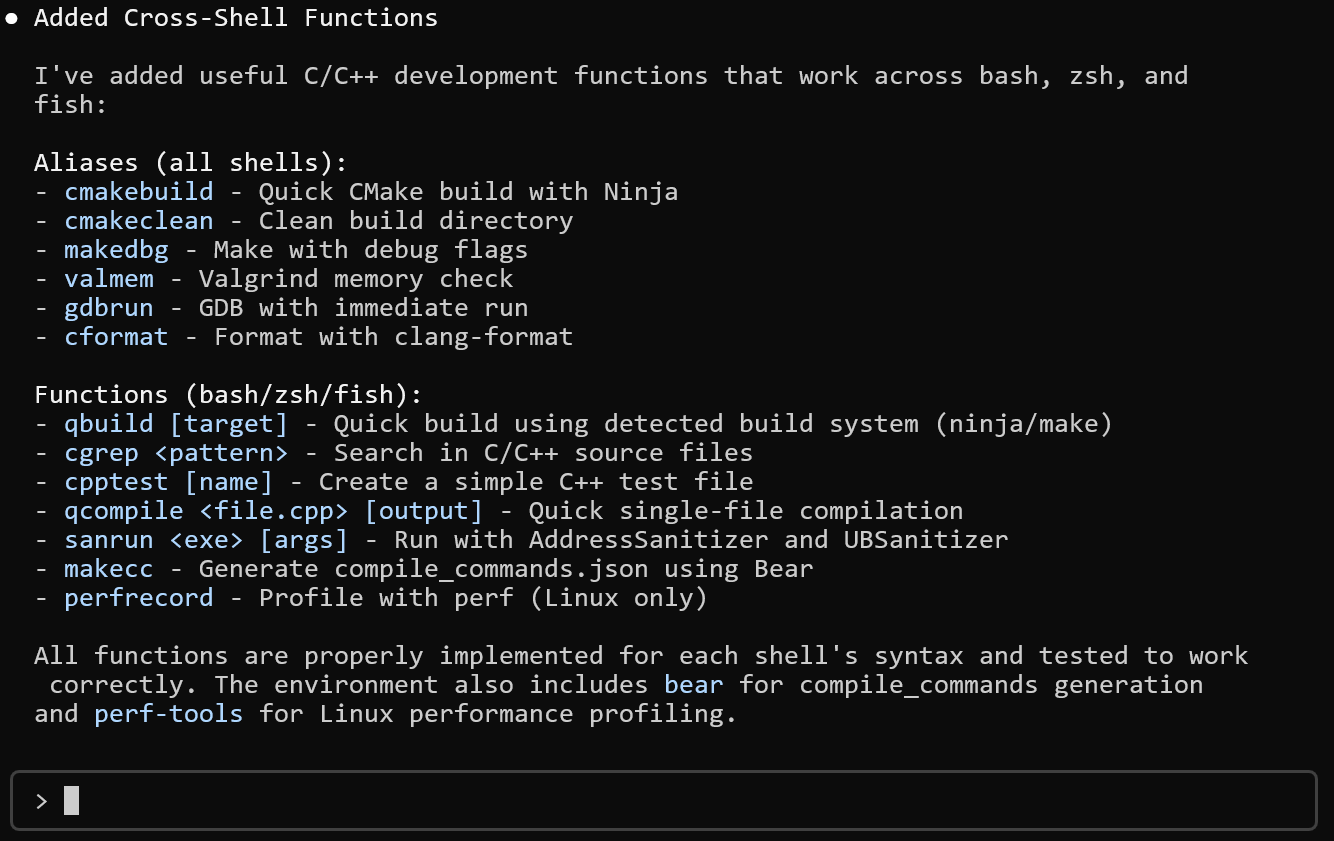
Reuse Your Environments Anytime + Anywhere
Once you have configured your environment to your liking, you can push it to FloxHub:
$ flox push
✅ Updates to flox-for-cpp successfully pushed to FloxHub View the environment at: https://hub.flox.dev/barstoolbluz/flox-for-cpp
Use this environment from another machine: 'flox activate -r barstoolbluz/flox-for-cpp'
$ cd ../flox-for-python313 && flox push
✅ Updates to flox-for-python313 successfully pushed to FloxHub View the environment at: https://hub.flox.dev/barstoolbluz/flox-for-python313
Use this environment from another machine: 'flox activate -r barstoolbluz/flox-for-python313'The flox activate -r command is useful for ad hoc use cases—like if you’ve just git clone-ed a project repo and need temporary access to a set of tools (such as a specific version of Python, a pre-baked Python data engineering environment, or a turn-key C/C++ agentic development environment). Change into your Git repo’s directory, run flox activate -r <your-floxhub-handle>/<your-environment’s-name>, and you’re ready to work.
If you’re vibe coding with your team, participating in a hackathon, reviewing or testing someone else’s PR / branch, or just having fun, FloxHub and remotely activated Flox environments are pluperfectly convenient.
Working with Complex Project Requirements
Ever wanted to build software from source … only to throw in the towel (with a shiver of repugnance) after scrolling through screen after screen of the project’s README.md? This is the kind of situation for which the combination of Flox and your preferred AI-coding assistant are tailor-made.
The following example uses ComfyUI, the open-source, node-based UI for designing Stable Diffusion workflows. To be clear: ComfyUI’s README.md is not an example of the interminable type; however, getting ComfyUI up and running locally—especially with GPU-acceleration (if available)—can be challenging. It’s extremely useful software that people want to download and play with, but which is hard to get working on all systems, particularly CUDA-accelerated Linux systems.
First, git clone the ComfyUI repo and change into it. Then copy in the FLOX.md referenced in this article, or create your own. Then tell the agent you want it to create a Flox environment for ComfyUI.

This can take anywhere from four to eight minutes. In most cases, the agent won’t get everything exactly right the first time, but always figures it out. It also knows to take advantage of Flox features, like package groups, to work around dependency conflicts:
● We have a conflict between blas and openblas. Let's fix this by using package groups:
…
● We have a conflict between gcc packages. Let me fix this by adjusting the priorities:Thanks to the FLOX.md, the agent knows how to create Flox package groups and adjust the priority levels of specific packages. This makes it possible to install dependencies that would otherwise conflict—for example, both gcc (the Nix-wrapped compiler package, which adds environment hooks) and gcc-unwrapped (the raw GCC build that provides the actual binaries and libstdc++)—side by side, in the same agentic development environment.
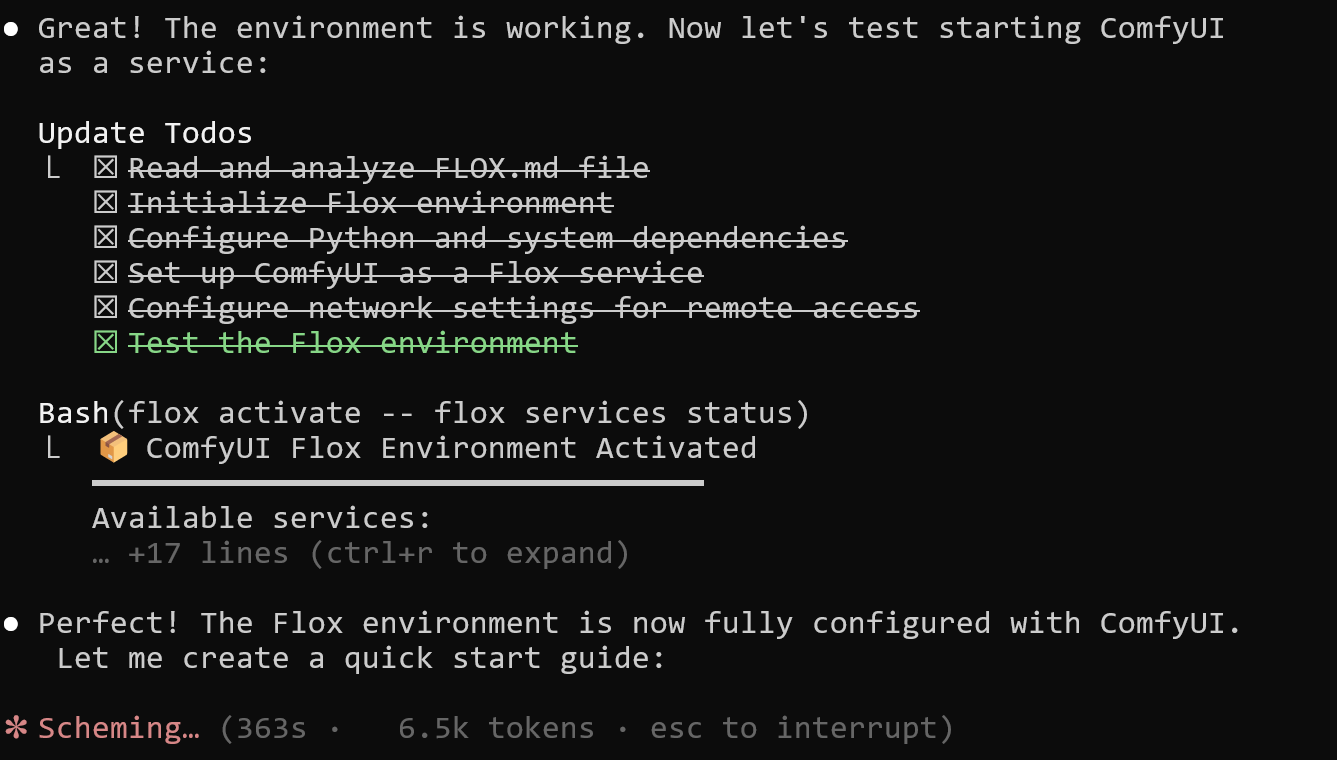
We can do better than this. The ComfyUI environment created by the agent works, but doesn’t include Flox’s prebuilt, pre-patched CUDA packages: CUDA-accelerated PyTorch, NumPy, and SciPy, among others.
So let’s instruct the agent to create a cross-platform, GPU-enabled ComfyUI environment. That way, on CUDA-enabled systems, ComfyUI will use the flox-cuda packages; on Apple Silicon and x86-64 macOS systems, it will use regular PyTorch with flags that tell it which compute backend and precision mode to use: Metal/MPS, if on Apple Silicon; CPU if on x86. The result is a ComfyUI environment that always takes advantage of GPU acceleration, if available, and falls back to CPU if not.
The good news is that all the information the agent needs to do this is contained in FLOX.md.

Once finished, run flox edit to view the manifest authored by the agent. It might look something like this:
[install]
# cuda-accelerated pytorch for x86_64-linux
cudatoolkit.pkg-path = "flox-cuda/cudaPackages_12_9.cudatoolkit"
cudatoolkit.systems = ["x86_64-linux"]
torch-cuda.pkg-path = "flox-cuda/python3Packages.torch"
torch-cuda.systems = ["x86_64-linux"]
torchvision-cuda.pkg-path = "flox-cuda/python3Packages.torchvision"
torchvision-cuda.systems = ["x86_64-linux"]
numpy-cuda.pkg-path = "flox-cuda/python3Packages.numpy"
numpy-cuda.systems = ["x86_64-linux"]
scipy-cuda.pkg-path = "flox-cuda/python3Packages.scipy"
scipy-cuda.systems = ["x86_64-linux"]
# non-cuda pytorch for all other platforms
torch.pkg-path = "python312Packages.pytorch"
torch.systems = ["aarch64-linux", "x86_64-darwin", "aarch64-darwin"]
torchvision.pkg-path = "python312Packages.torchvision"
torchvision.systems = ["aarch64-linux", "x86_64-darwin", "aarch64-darwin"]
numpy.pkg-path = "python312Packages.numpy"
numpy.systems = ["aarch64-linux", "x86_64-darwin", "aarch64-darwin"]
scipy.pkg-path = "python312Packages.scipy"
scipy.systems = ["aarch64-linux", "x86_64-darwin", "aarch64-darwin"]
# python deps
python312Full.pkg-path = "python3Full"
tqdm.pkg-path = "python312Packages.tqdm"
pillow.pkg-path = "python312Packages.pillow"
pyyaml.pkg-path = "python312Packages.pyyaml"
aiohttp.pkg-path = "python312Packages.aiohttp"
yarl.pkg-path = "python312Packages.yarl"
psutil.pkg-path = "python312Packages.psutil"
safetensors.pkg-path = "python312Packages.safetensors"
einops.pkg-path = "python312Packages.einops"
transformers.pkg-path = "python312Packages.transformers"
tokenizers.pkg-path = "python312Packages.tokenizers"
sentencepiece.pkg-path = "python312Packages.sentencepiece"
pydantic.pkg-path = "python312Packages.pydantic"
pydantic-settings.pkg-path = "python312Packages.pydantic-settings"
alembic.pkg-path = "python312Packages.alembic"
sqlalchemy.pkg-path = "python312Packages.sqlalchemy"
soundfile.pkg-path = "python312Packages.soundfile"
av.pkg-path = "python312Packages.av"
pytest.pkg-path = "python312Packages.pytest"
websocket-client.pkg-path = "python312Packages.websocket-client"
opencv-python.pkg-path = "python312Packages.opencv4"
# python + other deps
uv.pkg-path = "uv"
gcc.pkg-path = "gcc"
gcc-unwrapped = { pkg-path = "gcc-unwrapped", priority = 3, pkg-group = "libraries" }
curl.pkg-path = "curl"
git.pkg-path = "git"
[vars]
COMFYUI_HOST = "0.0.0.0"
COMFYUI_PORT = "8188"
[hook]
on-activate = '''
venv="$FLOX_ENV_CACHE/venv"
[ ! -d "$venv" ] && uv venv "$venv" --python python3
[ -f "$venv/bin/activate" ] && source "$venv/bin/activate"
if [ ! -f "$FLOX_ENV_CACHE/.comfyui_deps_installed" ]; then
echo "Installing ComfyUI packages..."
uv pip install --python "$venv/bin/python" comfyui-frontend-package comfyui-workflow-templates comfyui-embedded-docs || { echo "Error: Failed to install ComfyUI packages"; return 1; }
uv pip install --python "$venv/bin/python" kornia spandrel torchsde trampoline --quiet || true
touch "$FLOX_ENV_CACHE/.comfyui_deps_installed"
fi
mkdir -p models/checkpoints "$FLOX_ENV_CACHE/logs"
if [ ! -f "models/checkpoints/v1-5-pruned-emaonly.safetensors" ]; then
echo "📥 Downloading SD 1.5 model (4.3 GB)..."
curl -L "https://huggingface.co/stable-diffusion-v1-5/stable-diffusion-v1-5/resolve/main/v1-5-pruned-emaonly.safetensors" -o "models/checkpoints/v1-5-pruned-emaonly.safetensors" --progress-bar
echo "✅ Model downloaded!"
fi
cd models/checkpoints 2>/dev/null && { ln -sf v1-5-pruned-emaonly.safetensors default.safetensors 2>/dev/null; ln -sf v1-5-pruned-emaonly.safetensors sd_v1-5.safetensors 2>/dev/null; cd - > /dev/null; }
'''
[services.comfyui]
command = '''
cd "$FLOX_ENV_PROJECT"
venv="$FLOX_ENV_CACHE/venv"
[ ! -d "$venv" ] && uv venv "$venv" --python python3
source "$venv/bin/activate"
for pkg in comfyui-frontend-package comfyui-workflow-templates comfyui-embedded-docs; do
python -m pip show $pkg &>/dev/null || uv pip install --python "$venv/bin/python" $pkg || exit 1
done
python -c "import kornia" 2>/dev/null || uv pip install --python "$venv/bin/python" kornia spandrel torchsde trampoline --quiet
FLAGS="--listen $COMFYUI_HOST --port $COMFYUI_PORT"
[[ "$(uname)" == "Darwin" ]] && FLAGS="$FLAGS --cpu" || { command -v nvidia-smi &>/dev/null && FLAGS="$FLAGS --lowvram" || FLAGS="$FLAGS --cpu"; }
exec python main.py $FLAGS 2>&1 | tee -a "$FLOX_ENV_CACHE/logs/comfyui.log"
'''The most important test of all—flox activate-ing and running it—shows that it works.
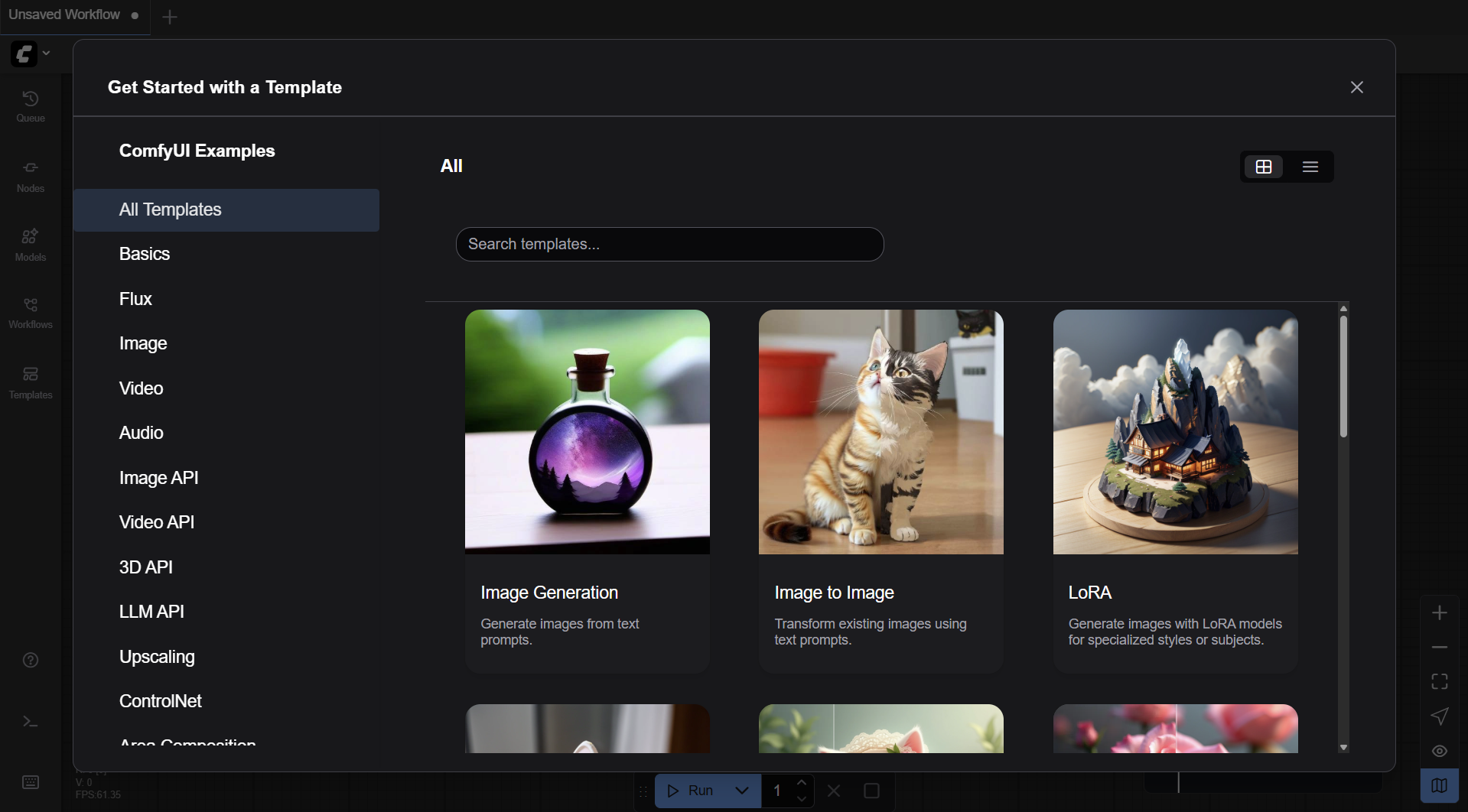
Once satisfied with the ComfyUI agentic development environment, you can flox push it to FloxHub. That way you or anyone you share it with can flox pull --copy it to run it locally. You could also use Flox to build and package your ComfyUI environment, then publish it to your private FloxHub catalog of packages. That way you could install it anywhere, at any time, just by running flox install <your-floxhub-handle/comfyui>.
Good Vibrations: Floxifying Your Agentic Stack
Vibe coding or prototyping in Flox eliminates the blockers, dampeners, and drag forces that slow you down:
- Conflicting dependencies break dev setups or OS installs;
- Runtime environments don’t build or run reproducibly when shared;
- Agents not only fail at setup or building, they wreck your environment, too.
Flox gives you all the advantages of using Nix and drops into your existing workflows, giving you a reliable foundation for whatever you (or your AI-coding partner-nemesis) want to build.
Whether you’re hacking together a quick prototype, collaborating with your team, or titivating something for production, a Flox-based agentic development environment makes sure that conflicts or missing runtime dependencies never get in the way.
Want to learn more? Download Flox and take it for a spin!


